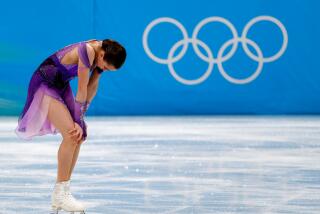Rogge Sees a Positive in Tests
- Share via
ATHENS — With positive doping tests at the 2004 Olympic Games at a record 20, and two days of competition remaining, President Jacques Rogge of the International Olympic Committee said Friday that the count was evidence of concrete progress in the anti-doping campaign.
“People are always asking me, ‘Don’t you feel that these positive tests will taint the reputation of the Games?’ I’m saying, and I’ve said it very many times, on the contrary,” Rogge said at a breakfast meeting with reporters.
“Each positive test is a blessing for us because it’s eliminating a cheat and it’s protecting the clean athletes. The more we find, the better our credibility and the better the credibility of sport.”
The count reached 20 Friday with the expulsion of Russian 400-meter runner Anton Galkin. It is likely to go higher over the final weekend, authorities said.
“People want to know what is credible or not,” Rogge said. “We’re not saying sport is 100% clean. But we’re saying we’re making major progress in the fight against doping. Because it has become increasingly more difficult to cheat, I think. That is the strong message.”
The count also continues a trend demonstrated at the Salt Lake City Winter Games of 2002. Those Games produced seven positive tests. The combined total of positive tests for all Winter Games from 1924 to 1998 was five.
The previous Summer Games record for positive tests was 12, set in Los Angeles in 1984. In Sydney four years ago, the number was 11. It was two in Atlanta in 1996, five in Barcelona in 1992.
The 2004 count includes rules violations such as the cases of Greek sprinters Costas Kenteris and Katerina Thanou, who were withdrawn from the Games after failing to appear for a test Aug. 12.
Rogge said one of the reasons for the success of the stepped-up campaign was that these Games were the first at which athletes were subject to testing for the full range of banned drugs before and during the Olympics.
Previously, the IOC tested for the full list only during the Games.
The IOC also announced that it will have conducted more than 3,000 tests here, 25% more than at Sydney four years ago.
Among the dopers caught was Russian Irina Korzhanenko, stripped of the gold medal in the women’s shotput. Women competed in the shotput at the ancient sanctuary at Olympia, the first time women had ever competed on the grounds. Korzhanenko tested positive for stanozolol, the same steroid that tripped up Canadian sprinter Ben Johnson in the 1988 Seoul Games.
That the shotput champion of the event at Olympia could test positive shows the depth of the problem, experts said. That she got caught shows that Olympic testing works. And that stanozolol is still on the scene amazed some anti-doping authorities.
“When you write the history of doping someday, this will be the Games where the line was pretty firmly drawn in the sand,” Dick Pound, IOC member and head of the World Anti-Doping Agency, said.
“We are not going to have any cheaters here, no matter who you are.
“If you’re the first woman who competed in Olympia in several thousand years, if you cheat, you’re toast.”
More to Read
Go beyond the scoreboard
Get the latest on L.A.'s teams in the daily Sports Report newsletter.
You may occasionally receive promotional content from the Los Angeles Times.






